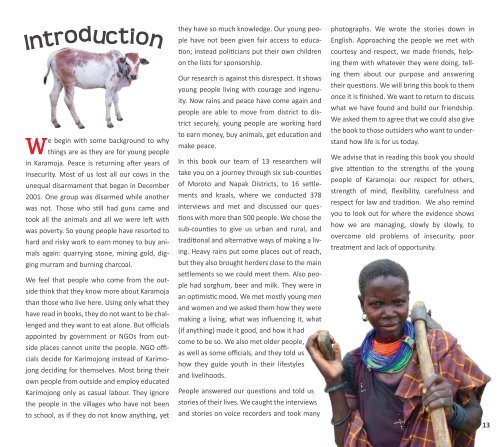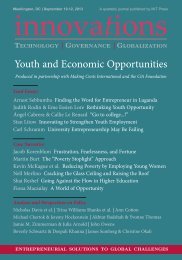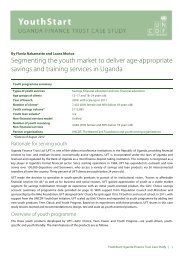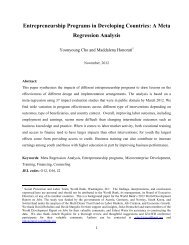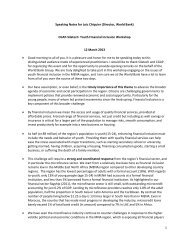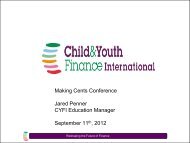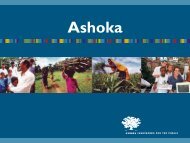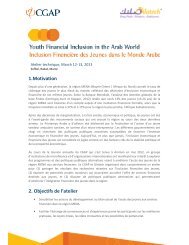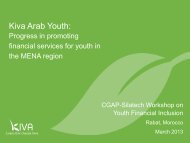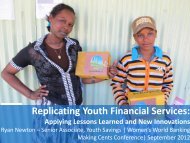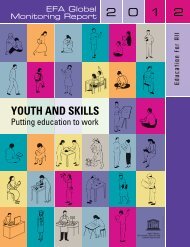Download - Institute of Development Studies
Download - Institute of Development Studies
Download - Institute of Development Studies
- No tags were found...
Create successful ePaper yourself
Turn your PDF publications into a flip-book with our unique Google optimized e-Paper software.
Introductionthey have so much knowledge. Our young peoplehave not been given fair access to education;instead politicians put their own childrenphotographs. We wrote the stories down inEnglish. Approaching the people we met withcourtesy and respect, we made friends, help-on the lists for sponsorship.ing them with whatever they were doing, tell-We begin with some background to whythings are as they are for young peoplein Karamoja. Peace is returning after years <strong>of</strong>insecurity. Most <strong>of</strong> us lost all our cows in theunequal disarmament that began in December2001. One group was disarmed while anotherwas not. Those who still had guns came andtook all the animals and all we were left withwas poverty. So young people have resorted tohard and risky work to earn money to buy animalsagain: quarrying stone, mining gold, diggingmurram and burning charcoal.We feel that people who come from the outsidethink that they know more about Karamojathan those who live here. Using only what theyhave read in books, they do not want to be challengedand they want to eat alone. But <strong>of</strong>ficialsappointed by government or NGOs from outsideplaces cannot unite the people. NGO <strong>of</strong>ficialsdecide for Karimojong instead <strong>of</strong> Karimojongdeciding for themselves. Most bring theirown people from outside and employ educatedKarimojong only as casual labour. They ignorethe people in the villages who have not beento school, as if they do not know anything, yetOur research is against this disrespect. It showsyoung people living with courage and ingenuity.Now rains and peace have come again andpeople are able to move from district to districtsecurely, young people are working hardto earn money, buy animals, get education andmake peace.In this book our team <strong>of</strong> 13 researchers willtake you on a journey through six sub-counties<strong>of</strong> Moroto and Napak Districts, to 16 settlementsand kraals, where we conducted 378interviews and met and discussed our questionswith more than 500 people. We chose thesub-counties to give us urban and rural, andtraditional and alternative ways <strong>of</strong> making a living.Heavy rains put some places out <strong>of</strong> reach,but they also brought herders close to the mainsettlements so we could meet them. Also peoplehad sorghum, beer and milk. They were inan optimistic mood. We met mostly young menand women and we asked them how they weremaking a living, what was influencing it, what(if anything) made it good, and how it hadcome to be so. We also met older people,as well as some <strong>of</strong>ficials, and they told ushow they guide youth in their lifestylesand livelihoods.People answered our questions and told usstories <strong>of</strong> their lives. We caught the interviewsand stories on voice recorders and took manying them about our purpose and answeringtheir questions. We will bring this book to themonce it is finished. We want to return to discusswhat we have found and build our friendship.We asked them to agree that we could also givethe book to those outsiders who want to understandhow life is for us today.We advise that in reading this book you shouldgive attention to the strengths <strong>of</strong> the youngpeople <strong>of</strong> Karamoja: our respect for others,strength <strong>of</strong> mind, flexibility, carefulness andrespect for law and tradition. We also remindyou to look out for where the evidence showshow we are managing, slowly by slowly, toovercome old problems <strong>of</strong> insecurity, poortreatment and lack <strong>of</strong> opportunity.13


